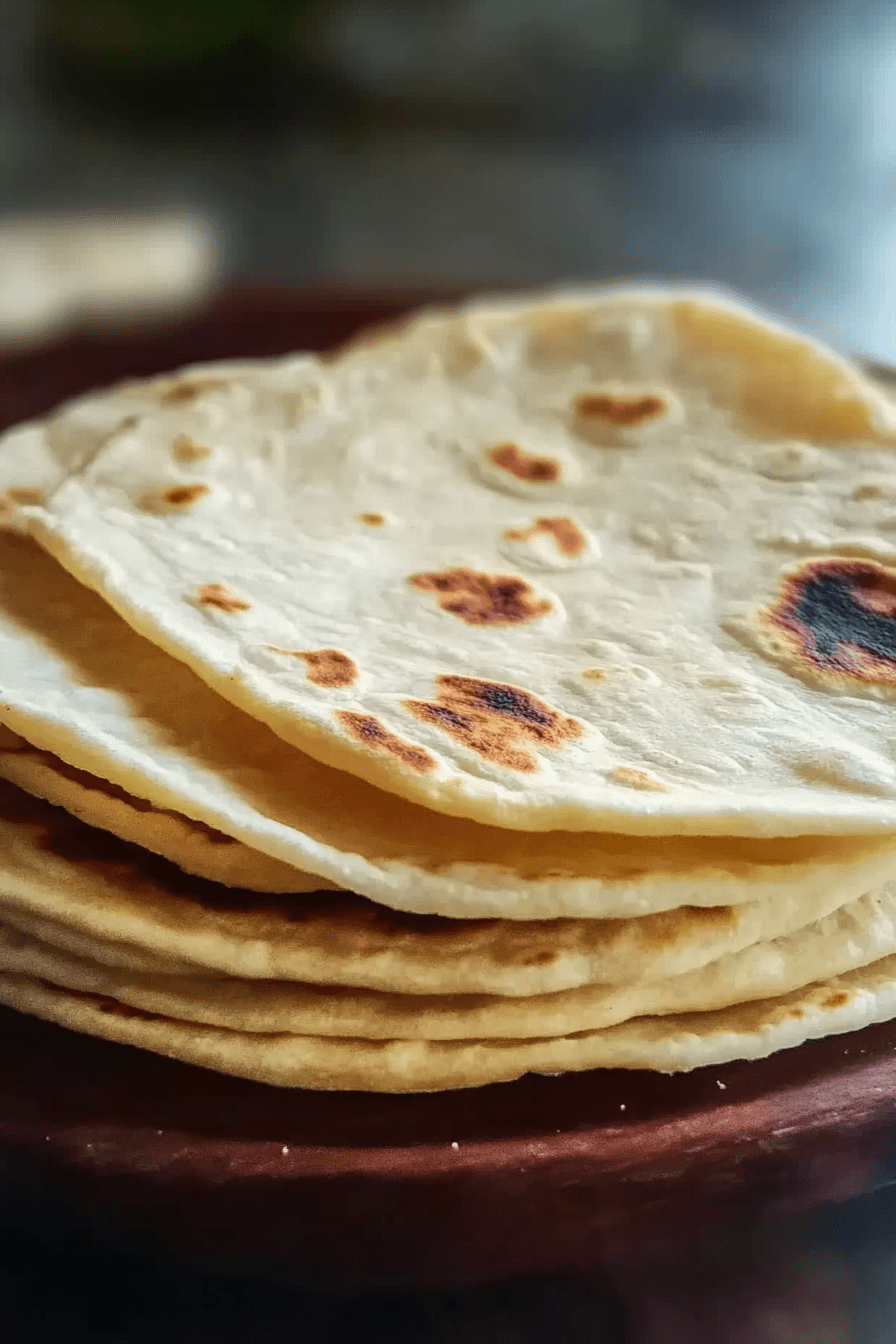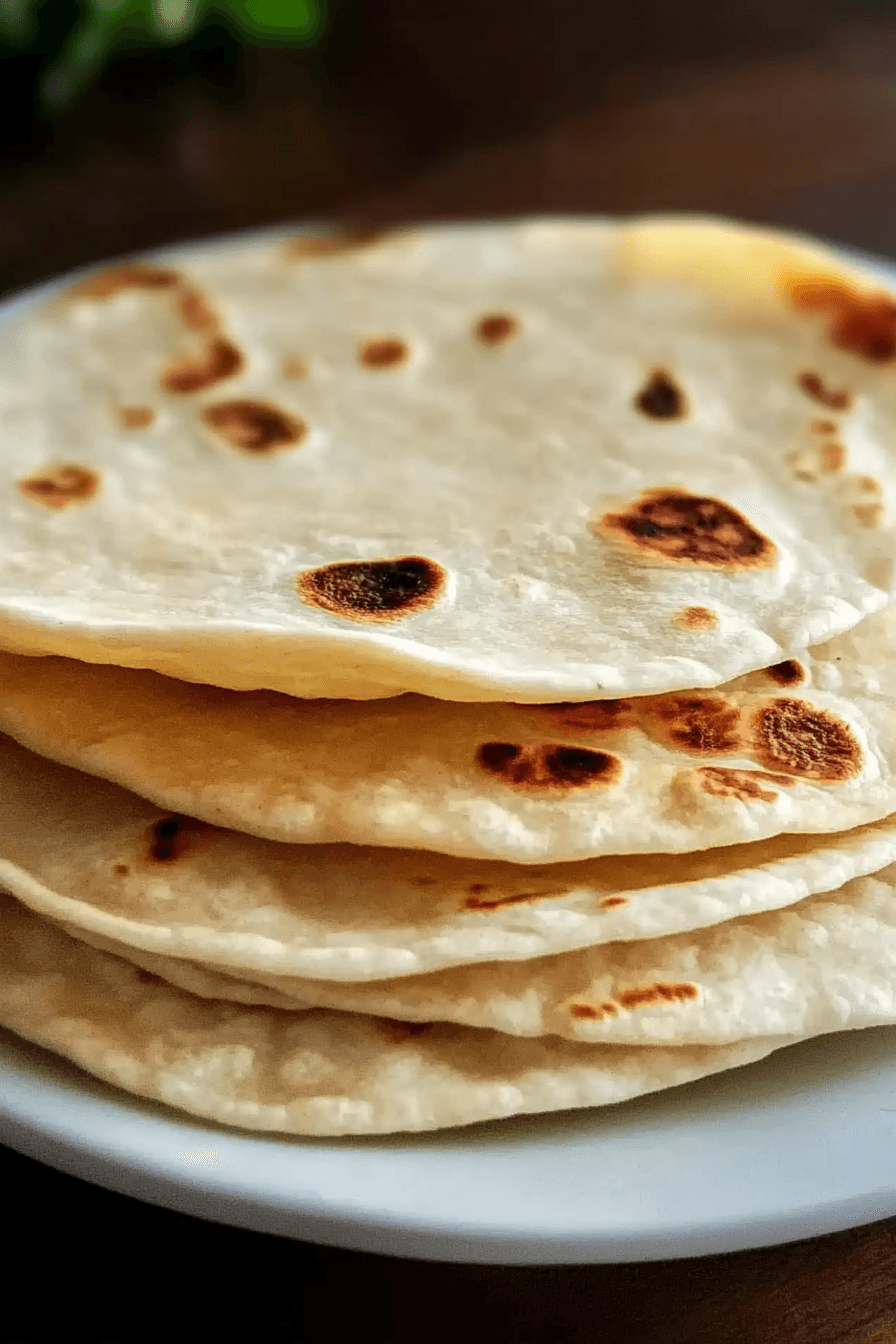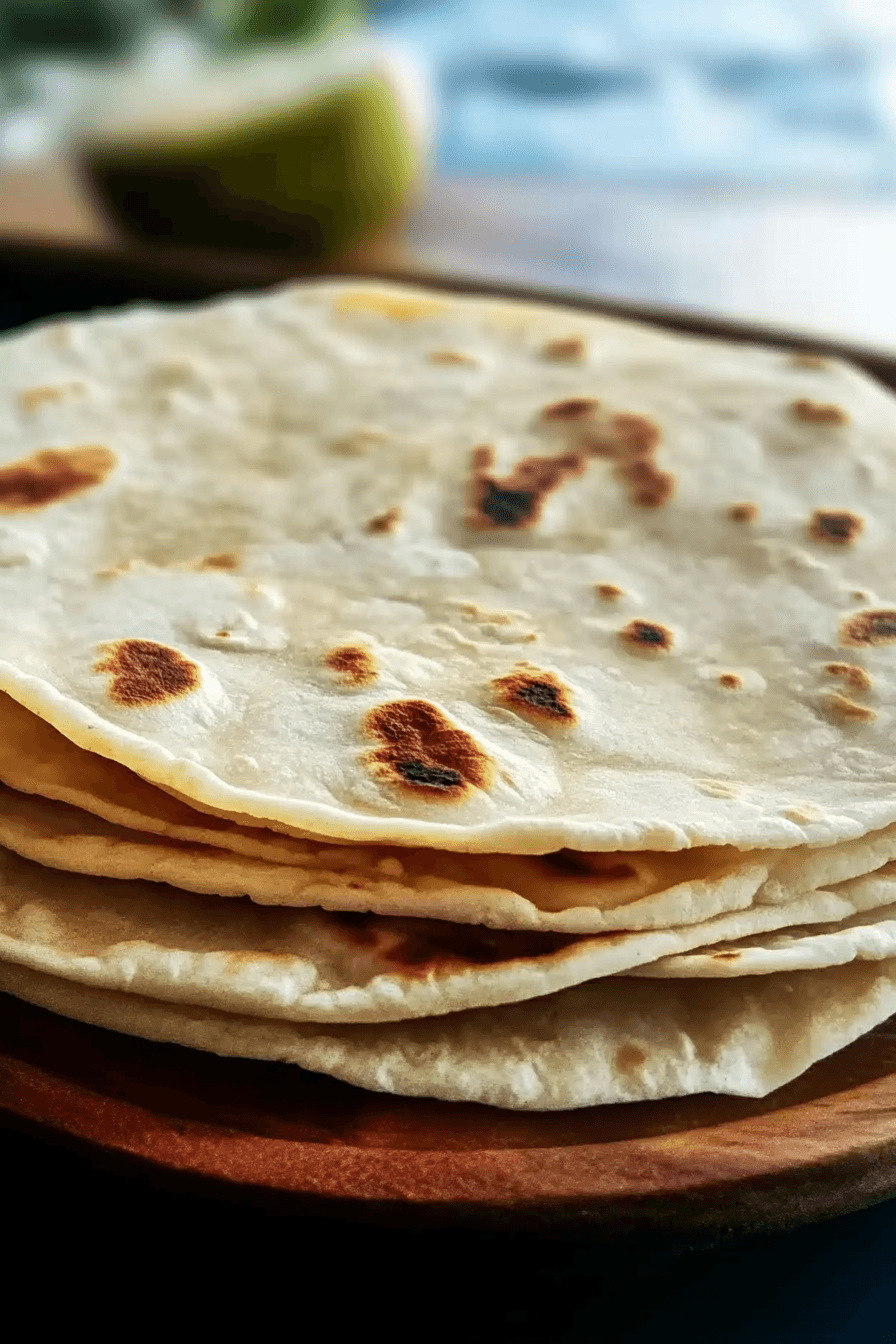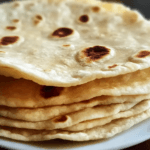Introduction to Homemade Tortillas Soft Flour Tortilla
Homemade tortillas, particularly the soft flour variety, offer an irresistible aroma and taste that store-bought options just can’t match. These tortillas are a simple, wholesome choice for anyone craving softness wrapped around flavorful fillings. With just a few basic pantry ingredients, you can create a comforting, vegan-friendly, and gluten-free meal. Perfect for busy parents, home cooks, or even students, homemade tortillas are versatile additions to any kitchen repertoire. Start crafting meals like tacos, burritos, and wraps that hold a piece of your heart with every delicious bite, and savor the joy of cooking.
Benefits and Advantages of Homemade Tortillas Soft Flour Tortilla
Creating homemade tortillas allows you to enjoy kitchen delights crafted to perfection. These tortillas are not only simple to prepare, but they also provide a healthier alternative to processed options, free from preservatives and artificial additives. Their superior softness and unique taste make them a favorite for gatherings or quiet family dinners alike. Another significant advantage is the ability to customize the flavor and texture, catering to diverse dietary preferences. Whether you’re a diet-conscious individual or a food enthusiast, homemade tortillas enrich your culinary skills and invigorate your daily meals with homemade satisfaction.

Ingredients Overview
Essential Ingredients for Homemade Tortillas Soft Flour Tortilla
Crafting homemade tortillas is a delightful and simple task that offers a sense of accomplishment. Here’s a detailed list of ingredients and their essential purposes:
- 3 cups all-purpose flour: Provides the structure and base of the tortilla. For gluten-free options, consider using chickpea or almond flour to maintain a similar texture.
- 1 teaspoon salt: Enhances flavor and balances the sweetness of other ingredients.
- 1 teaspoon baking powder: Acts as a leavening agent that helps the tortillas rise enough to create a soft texture.
- 1/3 cup oil: Offers flexibility and richness to your tortilla. Choose from olive oil, vegetable oil, or any neutral oil that fits your taste preference.
- 1 cup warm water: Assists in hydrating the flour, helping to develop structure when kneaded.
These essential ingredients can be customized to meet dietary needs. With accessible options to keep things simple, you can create delicious and versatile tortillas right in your kitchen.
Dietary Substitutions to Customize Your Homemade Tortillas Soft Flour Tortilla
Whether you’re catering to gluten-free, vegan, or low-calorie diets, homemade tortillas offer great flexibility:
- Gluten-free flour: Swap all-purpose flour with alternatives like chickpea or almond flour to create a gluten-free version without losing elasticity.
- Coconut oil: Use coconut oil instead of vegetable or olive oil for a subtle, exotic flavor, adding richness without animal products, making it vegan-friendly.
- Herbs and spices: Adding fresh herbs like cilantro or spices such as cumin into the dough can provide unique flavor twists while keeping the nutritional profile in check.
These substitutions enhance the variety and cater to your guests’ dietary preferences, ensuring everyone enjoys a taste of this homemade delight.
How to Prepare the Perfect Homemade Tortillas Soft Flour Tortilla: Step-by-Step Guide
The heart of crafting these delectable homemade tortillas lies in their preparation. This step-by-step guide will ensure your tortillas turn out soft and pliable, perfect for any meal.
First Step: Mixing the Ingredients
Start by combining all-purpose flour, salt, and baking powder in a large mixing bowl. Stir these dry ingredients thoroughly to distribute them evenly.
Second Step: Adding Fluid Elements
Pour in the oil (preferably olive oil for a subtle flavor) and warm water gradually, stirring as you mix. This combination forms a shaggy dough. If you’re implementing dietary changes, now’s the time to incorporate them, such as using coconut oil.
Third Step: Kneading the Dough
Transfer your shaggy dough onto a flat surface and begin kneading. Do this for 1-2 minutes until you achieve a smooth, elastic texture. Kneading enhances the dough structure and flexibility, making it ideal for tortillas.
Fourth Step: Resting Period
Cover the dough with a damp cloth and let it rest for 15-20 minutes. This resting period allows the gluten to relax, resulting in more tender finished tortillas.
Fifth Step: Portioning the Dough
Divide your well-rested dough into 8-10 equal portions, rolling each into a ball shape. This step is crucial for ensuring uniformity in size and cooking consistency.
Sixth Step: Rolling the Tortillas
With a rolling pin, flatten each dough ball into a thin circle, approximately 6-7 inches in diameter. The thinness ensures they cook evenly and remain soft.
Seventh Step: Cooking the Tortillas
Preheat a hot, dry skillet, ideally a cast-iron one for best results. Cook each tortilla for 45-60 seconds per side until light brown spots appear. Adjust the heat as necessary to prevent burning.
Eighth Step: Keeping Tortillas Soft
Once cooked, immediately stack the tortillas in a covered container or wrap them in a clean cloth. This steaming process helps maintain their softness and also makes them pliable for various uses.
This step-by-step guide ensures that you can prepare homemade tortillas that are delightful and catered to any personal or dietary needs, further enriching your culinary experience. Feel free to try these Buttermilk Biscuits with Pimento or Cheesy Chicken Jalapeno Popper Sliders recipes on Valentina Recipes to complement your tortillas.

Mastering Homemade Tortillas Soft Flour Tortilla: Advanced Tips and Variations
Once you’ve honed the basics of creating homemade soft flour tortillas, it’s time to delve into some advanced tips and explore exciting variations that can make your culinary experience even more delightful. These insights will enhance the texture, flavor, and overall appeal of your tortillas, turning them into a versatile and dependable staple in your kitchen. To help you achieve the best results, let’s dive deeper into some expert advice and creative ways to spice up your tortilla game.
Expert Tips for Perfecting Homemade Tortillas
- Use a Cast-Iron Skillet: While you can cook tortillas in any pan, a cast-iron skillet can provide the best results. It offers even heat distribution, ensuring a nice color and texture.
- Temperature Control: Adjust the heat as needed so that the tortillas develop light brown spots within 30 to 60 seconds. This allows them to cook through without becoming too dry.
- Steam to Retain Softness: After cooking, stack the tortillas in a container with a lid or cover them with a clean cloth. This allows them to steam slightly and remain soft and pliable.
Flavor Variations to Try
Tortillas are not only a blank canvas for flavors but also adaptable to suit various tastes. Here are some exciting variations to liven up your recipe:
- Herb-Infused Tortillas: Add finely chopped herbs like cilantro or parsley to the dough for a fresh twist. This addition can complement a variety of fillings, from vegetarian to meat-based options.
- Spiced Tortillas: Incorporate spices such as cumin or paprika into the flour mixture for an extra kick. This can add warmth and depth to tacos or quesadillas.
- Cheese-Blended Tortillas: Knead in grated cheese like cheddar or mozzarella to the dough for tortillas that melt in your mouth and enhance savory fillings.
How to Store Homemade Tortillas Soft Flour Tortilla: Best Practices
Storing your homemade soft flour tortillas properly ensures they stay fresh and delicious for as long as possible. Here are some best practices for keeping your tortillas at their best, whether you’re planning to store them short-term or long-term.
Refrigeration and Freezing Techniques
To extend the shelf life of your tortillas, refrigeration and freezing are excellent options:
- Refrigeration: Place tortillas in an airtight container or seal them in a plastic bag to prevent them from drying out. They can be stored in the refrigerator for up to a week.
- Freezing: If you’d like to store tortillas for an extended period, freezing is the best solution. Stack the tortillas with a piece of parchment paper between each, place them in a freezer-safe bag, and freeze. They will last up to three months.
Reheating Homemade Tortillas
Reheating tortillas carefully is crucial to retain their soft texture and flavor. Here’s how you can do it:
- Skillet Method: Warm tortillas in a dry skillet over medium heat for about 15-20 seconds on each side.
- Microwave Technique: Wrap tortillas in a damp cloth or paper towel and heat for 30 seconds in the microwave. This method helps maintain moisture.
For a detailed exploration of tortillas, you might find this Britannica article on tortillas helpful. Additionally, learn more about the traditional preparation and significance of tortillas in various cuisines from this Wikipedia entry on tortillas.

Nutritional Value of Homemade Tortillas Soft Flour Tortilla
Homemade tortillas, especially soft flour tortillas, offer a balance of nutrients that can cater to a variety of dietary needs, making them a versatile addition to any meal. Let’s explore their nutritional profile in detail.
Macronutrients Overview
Soft flour tortillas primarily consist of carbohydrates, providing energy for your daily activities. A single homemade tortilla typically contains around:
- Calories: 150
- Carbohydrates: 25 grams
- Protein: 3 grams
- Fat: 4 grams
The protein content is derived mainly from the flour, making it a modest source of protein. Additionally, the inclusion of oil contributes to the fat content, adding flavor and texture, while ensuring they stay soft.
Micronutrients and Fiber
Flour tortillas do provide some essential vitamins and minerals, though they are not as rich in nutrients compared to whole grain or corn tortillas. They contain:
- Calcium: Supports bone health
- Iron: Helps in the production of hemoglobin
- Sodium: Naturally present due to the salt in the recipe
It’s important to note that adding more whole grain flour or incorporating ingredients like corn can significantly boost the fiber content, aiding digestion and providing more satiety.
Customizing for Dietary Needs
For those monitoring their nutritional intake, these tortillas can be customized. Consider using gluten-free flour for a wheat-free version or eliminating oil for a lower-fat option. Additionally, adjusting the thickness of the tortillas can modify their caloric content.
Balanced Diet Considerations
Integrating homemade soft flour tortillas into your meals offers the flexibility to pair them with nutritious fillings, enhancing their overall nutritional value. Whether stuffed with proteins, vegetables, or grains, these tortillas can complement a balanced diet, providing both functional nutrition and enjoyment.
FAQs: Frequently Asked Questions About Homemade Tortillas Soft Flour Tortilla
- What ingredients are needed to make soft homemade flour tortillas?
- To make soft homemade flour tortillas, you need all-purpose flour, salt, baking powder, oil (olive, vegetable, or another neutral choice), and warm water. These simple ingredients make the process both efficient and rewarding.
- How do I achieve the right consistency for the dough when making homemade flour tortillas?
- To achieve the perfect dough consistency, combine all the dry ingredients, then mix in the oil and warm water until a shaggy dough forms. Kneading for 1-2 minutes will result in a smooth, elastic dough. If too dry, add a bit more water; if sticky, incorporate more flour.
- What is the best way to cook homemade flour tortillas to keep them soft and pliable?
- The best way to cook them is on a hot, dry skillet. Cook each side for about 45-60 seconds, ensuring light brown spots appear. Stack the cooked tortillas in a covered container immediately to allow them to steam and remain soft and pliable.
- How long can homemade flour tortillas be stored, and how should they be reheated?
- Stored in an airtight container, homemade flour tortillas can last up to 3 days in the refrigerator and up to 2 months in the freezer. Reheat them using a warm skillet or microwave to restore softness. For best results, avoid overheating to maintain their delicate texture.
- Can I make variations to the basic recipe?
- Absolutely! You can incorporate herbs, spices, or substitute flours to suit your taste or dietary requirements. The flexibility of this recipe allows for creativity, whether aiming for a savory or sweet tortilla.

Homemade Tortillas Soft Flour Tortilla Recipe Easy
- Total Time: 30 minutes
Description
🌮 Make irresistibly soft and chewy homemade flour tortillas with simple ingredients—no preservatives, just pure, fresh flavor! 🌮
🔥 Quick, easy, and perfect for tacos, burritos, & more—once you try them, you’ll never go back to store-bought! 🔥
Ingredients
3 cups all-purpose flour
1 teaspoon salt
1 teaspoon baking powder
1/3 cup oil (olive oil, vegetable oil, or other neutral oil)
1 cup warm water
Instructions
1. Mix the flour, salt, and baking powder in a bowl.
2. Add the oil and warm water, then stir to form a shaggy dough.
3. Knead the dough for 1 to 2 minutes until it becomes smooth.
4. Cover the dough and let it rest for 15 to 20 minutes.
5. Divide the dough into 8 to 10 equal portions and shape them into balls.
6. Roll each dough ball into a thin circle about 6 to 7 inches in diameter.
7. Heat a dry skillet over medium-high heat.
8. Cook each tortilla for 45 to 60 seconds per side until light brown spots appear.
9. Stack the cooked tortillas in a covered container to keep them soft and pliable.
10. Serve warm or store in the refrigerator or freezer for later use.
Notes
Let the dough rest for at least 15 minutes to relax the gluten, making it easier to roll out.
Use a hot, dry skillet to cook the tortillas quickly, creating soft and pliable results with light brown spots.
Stack the cooked tortillas in a covered container or wrap them in a clean kitchen towel to keep them warm and soft.
- Prep Time: 20
- Cook Time: 10
- Category: Bread
- Method: Stovetop
- Cuisine: Mexican

